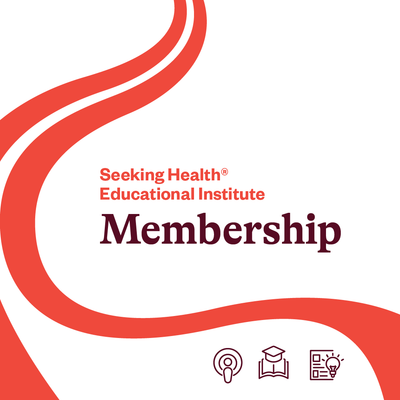TL;DR: Tongue-tie, a condition where a thick tissue band restricts tongue movement, can affect eating, speaking, and overall oral health. Genetic factors (such as MTHFR variations), environmental influences, and methylation issues may contribute to tongue-tie. Supporting methylation during pregnancy, including avoiding synthetic folic acid and opting for natural folate forms, can reduce the risk. Symptoms of tongue-tie include breastfeeding difficulties, jaw and dental problems, mouth breathing, and fatigue. Seeking a healthcare professional for evaluation and release is crucial for proper treatment.
What is Tongue Tie and How Does It Affect Health?
Tongue-tie—also called ankyloglossia—is a condition where a thick band of tissue connects the tongue's tip to the mouth's floor, limiting its movement. This restriction can lead to various issues, affecting activities like eating, speaking, and other tasks that require the tongue to move freely.1

It can occur in varying degrees, from mild to severe, and can range from being barely noticeable to significantly impacting daily activities like eating and speaking.
Overall, tongue ties in newborns are estimated to occur in 4% to 11% of cases, but some studies suggest the actual number could be much higher when healthcare practitioners are actively diagnosing and assessing the condition.2
Boys are more likely to have tongue ties because it's a trait that's partly inherited through the X chromosome. It's also more common in people with some degree of orofacial clefts.3

Tongue ties affect the entire body and can really impact overall health. They can affect children and adults in different ways.
In babies and children:
- Difficulty latching and breastfeeding problems (more on this later)
- Trouble closing the mouth or controlling the tongue
- Mouth breathing
- Crowded teeth
- Snoring
- Poor weight gain
- Difficulty with speech development, lisp
In adults:
- Speech issues, such as a lisp
- Underdeveloped jaw, tightness
- Teeth grinding (bruxism)
- Mouth breathing
- TMJ (temporomandibular joint) problems
- Back pain
- Snoring and breathing issues during sleep
- Dental problems, including tooth decay
- Headaches or migraines
- Neck and shoulder pain
- Poor posture
- Fatigue due to disrupted sleep or breathing issues
The Main Causes of Tongue Ties and Cleft Palate
Around 40% of cleft palate cases are caused by genetic factors, which means they often run in families, and it's the same with tongue ties.4
However, the rest are linked to environmental factors that impact proper DNA methylation (gene expression), such as:
- Maternal nutritional deficiencies, especially in natural folates (not synthetic folic acid), vitamin B12, B6, B2, iron, and choline.5
- Exposure to environmental chemicals, such as heavy metals, bisphenol A (BPA), and pesticides.6
- Alcohol consumption by both father and mother.7
- Smoking.8
- Viral infections (such as adenoviruses, herpesviruses - like EBV, and papillomaviruses).9
- Stress.10
The Surprising Link Between Tongue Tie and MTHFR

Research shows that those with MTHFR variations are more at risk of cleft lip and palate.11 For example, if a mother has a specific variation of the MTHFR gene (called C677T), the risk of her baby having a cleft lip or palate is 4.6 times higher.12
That’s because MTHFR is a key enzyme in the body's methylation process, which produces methyl folate. Eventually, this helps recycle SAM, a compound that plays a crucial role in regulating gene expression and cellular processes.13
It's important to remember that a person with an MTHFR variation can still have children without tongue ties. The key factors here are diet, lifestyle, and environment, which play a crucial role in supporting the individual's unique methylation needs.
How to Support Methylation During Pregnancy to Reduce the Risk of Tongue-Tie

Supporting methylation during pregnancy is really important to help manage the risk of developing tongue ties and congenital anomalies. It helps support healthy gene expression and immune system function, so your baby is born healthy.
Here are some key ways to support methylation during pregnancy:
- Avoid synthetic folic acid in foods and supplements and instead opt for natural forms of folate, such as folinic acid or methyl folate, before conception and throughout pregnancy.14,15 Folate plays a crucial role in supporting a healthy pregnancy, regardless of whether you have the MTHFR gene variation. Prioritize natural folate sources to ensure optimal health for both you and your baby.†
- Limit or reduce foods high in catechol-containing polyphenols, like coffee, tea, potatoes, and sweet potatoes, particularly during the first trimester of pregnancy, as they can inhibit DNMT1, an enzyme related to DNA methylation and proper gene expression.16
- Maintaining balanced levels of vitamin A in the form of retinol is essential during pregnancy, as it plays a vital role in embryogenesis, particularly in the development of the upper lip and palate.17,18 You should avoid consuming too much or too little of it.†
How a Tongue-Tie Can Impact Breastfeeding: Key Symptoms to Watch For

Tongue-tie can significantly affect breastfeeding and interfere with proper latching. This can lead to a low milk supply and early weaning.19 Here are some common symptoms to watch for during breastfeeding:
- Difficulty Latching: The baby may struggle to latch onto the breast correctly.
- Persistent Pain: Ongoing pain while breastfeeding that doesn’t improve with time.
- Baby Gets Frustrated: Your baby may become upset or frustrated during feedings.
- Noisy Feeding: Clicking or gulping sounds during feedings could indicate an improper latch.
- Fatigue During Feedings: Your baby may become tired quickly due to difficulty sucking.
- Poor Weight Gain: Insufficient weight gain despite frequent feedings.
- Recurring Clogged Ducts or Mastitis: Frequent issues with blocked milk ducts or breast infections.
If you think a tongue-tie is impacting your daily life or your child's life, consult with a specialized healthcare professional, such as a functional dentist, who is experienced in assessing and performing tongue-tie releases. Only a professional can evaluate the severity of the condition and recommend the best course of action to improve oral function and overall health.
Prenatal Supplements by Seeking Health™

Your baby relies on you—and no one else—for proper nourishment and a healthy start to life! Seeking Health™ offers a variety of prenatal supplements specially formulated by Dr. Ben Lynch to support healthy methylation processes, fertility, pregnancy, and breastfeeding.†
- Optimal Prenatal is formulated with a unique blend of nutrients—including calcium, zinc, iodine, choline, vitamin B12 (as methylcobalamin), and folate (as L-5-MTHF or methylfolate). This supplement also includes active B6 and ginger to promote digestive comfort. It may help support healthy methylation and immune system health and provide targeted support for individuals with MTHFR mutations.†
- Prenatal Essentials contain key pregnancy nutrients, including methylated forms of folate, B12, and trimethylglycine (TMG). They support healthy MTHFR, BC01, and GST/GPX genes that are crucial for healthy fertility, pregnancy, and cell division.†
- Prenatal Essentials MF supports healthy immune, spine, and brain development. Prenatal Essentials MF contains B12 and folate in bioavailable, methyl-free forms to support optimal methylation for individuals genetically sensitive to methylated nutrients.†
- Optimal Prenatal MF is a high-strength, first-of-its-kind, non-methylated prenatal supplement containing a blend of amino acids, chelated minerals, and bioavailable B vitamins to support a healthy pregnancy. It’s also formulated for individuals who are genetically sensitive to methylated nutrients.†
None of the supplements in our prenatal collection contain iron. This allows you to customize your iron intake as your healthcare practitioner advises which may be more gentle on your body.†
The Bottom Line

A tongue-tie can significantly impact both babies and adults, affecting daily activities like eating, speaking, breathing, and breastfeeding. It is often linked to genetic factors, environmental influences, and issues with methylation which may be caused by MTHFR mutations. Supporting proper methylation, especially during pregnancy, is essential for supporting a healthy pregnancy to help manage the risk for tongue-tie and other congenital anomalies. This can be achieved by avoiding synthetic folic acid and choosing natural folate forms like methyl or folinic acid. If you suspect tongue tie, whether in yourself or your child, seeking guidance from a healthcare professional, like a functional dentist, is crucial for an accurate diagnosis and effective treatment.†

References:
- https://www.ncbi.nlm.nih.gov/books/NBK482295/
- https://pubmed.ncbi.nlm.nih.gov/26038641/
- https://pubmed.ncbi.nlm.nih.gov/11559848/
- https://pmc.ncbi.nlm.nih.gov/articles/PMC7491837/
- https://pmc.ncbi.nlm.nih.gov/articles/PMC7246552/
- https://pmc.ncbi.nlm.nih.gov/articles/PMC4856164/
- https://pmc.ncbi.nlm.nih.gov/articles/PMC3860423/
- https://pmc.ncbi.nlm.nih.gov/articles/PMC3713237/
- https://pubmed.ncbi.nlm.nih.gov/37269984/
- https://pubmed.ncbi.nlm.nih.gov/29344930/
- https://pubmed.ncbi.nlm.nih.gov/25219684/
- https://pubmed.ncbi.nlm.nih.gov/12011160/
- https://pmc.ncbi.nlm.nih.gov/articles/PMC8703276/
- https://pubmed.ncbi.nlm.nih.gov/32868164/
- https://pubmed.ncbi.nlm.nih.gov/35204698/
- https://pubmed.ncbi.nlm.nih.gov/16037419/
- https://pubmed.ncbi.nlm.nih.gov/15108587/
- https://pubmed.ncbi.nlm.nih.gov/21967161/
- https://pubmed.ncbi.nlm.nih.gov/15709057/
† These statements have not been evaluated by the Food and Drug Administration (FDA). This product is not intended to diagnose, treat, cure, or prevent any disease.












